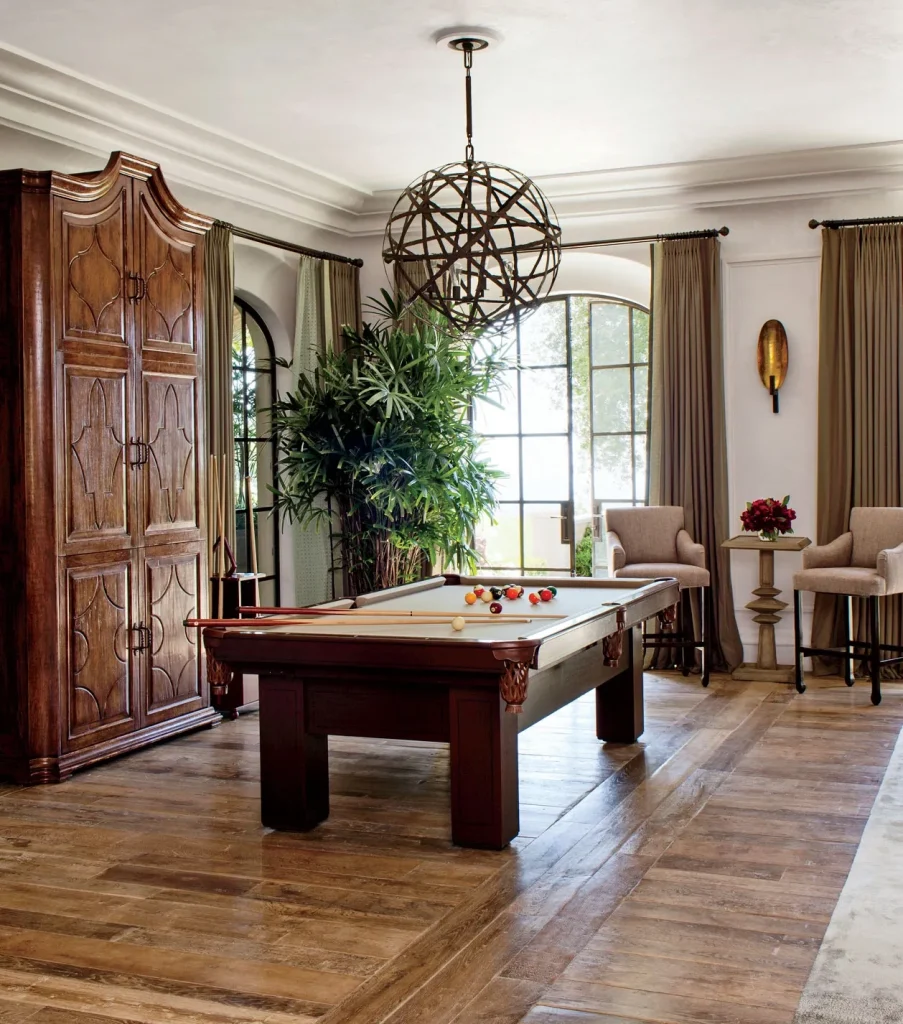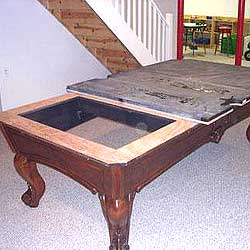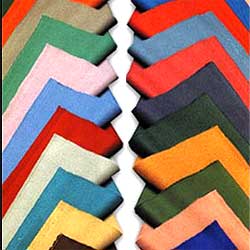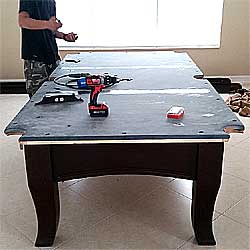Call us; 1-508-254-5671
Westfield, MA
Pool Table Billiard Movers and Repair
With 30 years of pool table best practices. Westfield, Massachusetts
Where can I find professional repair, re-felt, re-level services for my pool billiard table? Can you suggest a trustworthy billiard pool table mover for relocating my table?
How can I get my pool table safely moved?
I acquired a billiard table via the internet, and who will install and move it? Corner Pocket Pool Table Services, Your safest, best choice. In Westfield, MA, Massachusetts MA, New Hampshire NH, Vermont VT, Rhode Island RI, Pool billiard table work.
Pool table felt replacement and movers, relocating and repairing pool tables in Westfield, Massachusetts neighborhoods for more than thirty years. Moving and repairing all styles and brands of billiards tables.
Corner Pocket Pool Table Service is a family business, and covering Westfield, Massachusetts. Billiard and pool table movers and service experts.
We will re-felt and tune-up your billiard table, or move your table within new england, starting from Westfield.
Five star ratings and reviews, Westfield, Massachusetts.

Westfield, MA Local Pool Table Movers
Westfield, MA Local Billiard Table Movers
Move a pool table from Westfield, MA
Move a pool table to Westfield, MA
Westfield, MA Pool Table Moving
Companies that move Pool Tables
Westfield, MA Re-Felting Pool Tables
Westfield, MA Pool Table Repairs
Westfield, MA Fix my Pool Table
Westfield, MA Pool Table Refelting
Westfield, MA Refelting A Pool Table
Westfield, MA Pool Table Mover

Westfield is a city in Hampden County, in the Pioneer Valley of western Massachusetts, United States. Westfield was first settled by Europeans in 1660. It is part of the Springfield, Massachusetts Metropolitan Statistical Area. The population was 40,834 at the 2020 census.
The area was originally inhabited by the Pocomtuc, and was called Woronoco (meaning “the winding land”). Trading houses were built in 1639 to 1640 by European settlers from the Connecticut Colony. Massachusetts asserted jurisdiction, and prevailed after a boundary survey. In 1647, Massachusetts made Woronoco part of Springfield. Land was “incrementally purchased from the Native Americans and granted by the Springfield town meeting to English settlers, beginning in 1658.” The area of Woronoco or “Streamfield” began to be permanently settled in the 1660s. In 1669, “Westfield” was incorporated as an independent town; in 1920, it would be re-incorporated as a city. The name Westfield would be named for being at the time the most westerly settlement. “Streamfield” was considered a name for the town for being settled in between two “streams” that flow downtown, the Westfield River and the Little River.
From its founding until 1725, Westfield was the westernmost settlement in the Massachusetts Colony, and portions of it fell within the Equivalent Lands. Town meetings were held in a church meeting house until 1839, when Town Hall was erected on Broad Street. This building also served as City Hall from 1920 to 1958. Due to its alluvial lands, the inhabitants of the Westfield area were entirely devoted to agricultural pursuits for about 150 years.
Early in the 19th century, the manufacture of bricks, whips, and cigars became economically important. At one point in the 19th century, Westfield was a prominent center of the buggy whip industry, and the city is still known as the “Whip City”. Other firms produced bicycles, paper products, pipe organs, boilers and radiators, textile machinery, abrasives, wood products, and precision tools. Westfield transformed itself from an agricultural town into a thriving industrial city in the 19th century, but in the second half of the 20th century its manufacturing base was eroded by wage competition in the U.S. Southeast, then overseas.
Meanwhile, with cheap land and convenient access to east–west and north–south interstate highways, the north side developed into a warehousing center to C & S Wholesale, Home Depot, Lowes and other corporations. South of the river, the intersecting trends of growth of Westfield State University and declining manufacturing changed the city’s character. Students comprise some 15% of Westfield’s population, and the old downtown business district caters increasingly to them while mainstream shopping relocates to a commercial strip called East Main Street, part of U.S. Route 20.
Only four buildings exceed four stories in height. Until a major fire on January 6, 1952, the Westfield Professional Building covered half a downtown city block and was six stories tall. The entire building was consumed with extensive damage to neighboring buildings because the fire department’s ladder and snorkel vehicles weren’t tall enough and the building did not have a sprinkler system. Subsequent zoning prohibited virtually all new construction over three stories, even after improvements in fire suppression technologies and vehicles became available. No building is allowed to be taller than the town’s firetruck ladders.
In the early 20th century, Westfield was at the center of the Pure Food movement, an effort to require stricter standards on the production of food. Louis B. Allyn, a Westfield resident and pure foods expert for McClure’s Magazine, lived in Westfield until his murder. In 1906, Congress passed the Pure Food and Drug Act of 1906. In June 2017, the administration of Massachusetts Governor Charlie Baker announced a $300,000 grant to the city for an industrial park expansion.
Diverse Tables
From basic models, to less common; custom, hand-made tables and everything in the middle. We’ve seen a great many them. Not to say that we have really seen each model of table that there is… The standards are much the same starting with one then onto the next. Occasionally we see a new technique. We love to learn these, and it is always enjoyable to have a finished product you will love!Distinctive Houses
From Landmark houses in Westfield, to delightful little homes, we’ve placed tables in every one of them.
Also, we treat every house like our own. We anticipate giving you the best working pool table you’ve ever played on.

